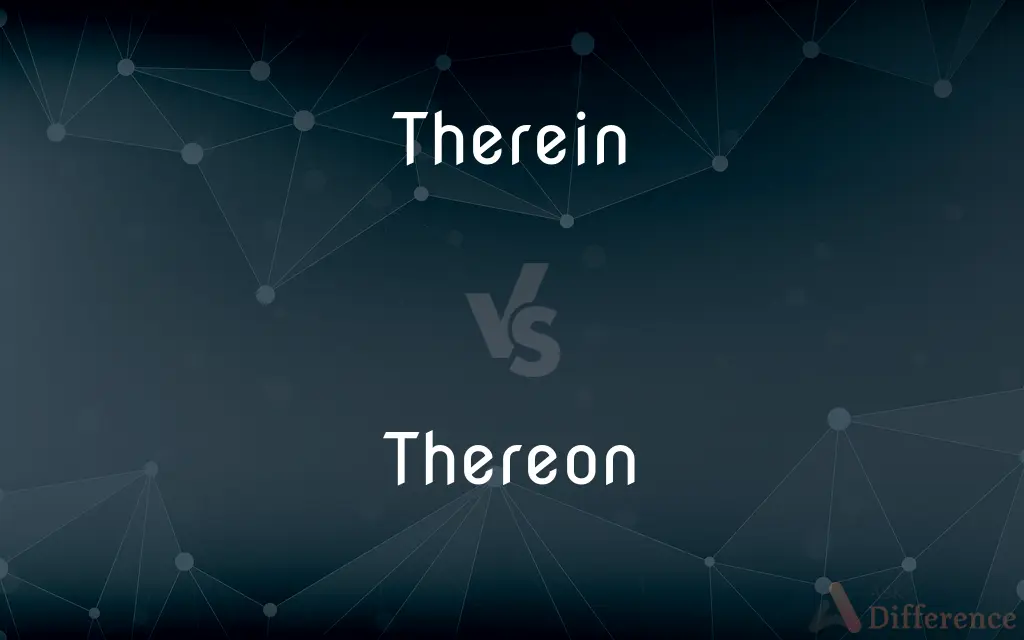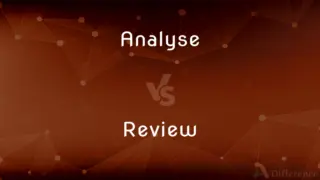Therein vs. Thereon — What's the Difference?
By Tayyaba Rehman & Urooj Arif — Updated on March 18, 2024
Therein and thereon both relate to locations, but while therein emphasizes 'inside' or 'within', thereon focuses on 'on top of' or 'upon'.

Difference Between Therein and Thereon
Table of Contents
ADVERTISEMENT
Key Differences
Therein refers to being inside or within something, suggesting inclusion or presence within boundaries. It is often used in legal, literary, and formal contexts to denote something contained within a document, place, or concept. Thereon, on the other hand, points to something being on top of or upon a surface or object. It is less commonly used in everyday language but finds its place in formal, legal, and written English. Thereon might be used when referring to something placed on a surface, like, "The vase placed thereon was antique.
In terms of usage, therein is more about the conceptual or physical contents within something, whereas thereon is about the position or continuation on a surface. For instance, in legal documents, therein might refer to details within the document, while thereon could refer to actions or conditions applied to the subject matter discussed earlier.
The difference also lies in the implication of space and boundary. Therein suggests an enclosed space or concept, inviting the reader or listener to think about what lies inside. Thereon, meanwhile, evokes the idea of a base or platform, directing attention to what rests atop or follows in sequence.
While both terms are formal and somewhat archaic, their usage depends heavily on the context—therein for internal contents or elements, and thereon for surface placement or sequential continuation. They serve to provide precision in legal, literary, and formal registers, aiding in the clear delineation of space, position, and conceptual boundaries.
Comparison Chart
Meaning
Inside or within something
On top of or upon something
ADVERTISEMENT
Usage Context
Legal, literary, formal
Legal, formal, written
Implication
Enclosure, inclusion within boundaries
Placement on a surface, continuation
Commonality
More common in legal and formal documents
Less common, mostly used in formal or legal contexts
Example Sentence
"The details specified therein are crucial."
"The documents placed thereon were signed immediately."
Compare with Definitions
Therein
Within a place or thing.
The answer lies therein.
Thereon
On that topic or subject.
Further discussions based thereon were fruitful.
Therein
In that respect or matter.
Therein lies the problem.
Thereon
On that surface or area.
The contract thereon had a signature.
Therein
In that document or book.
Refer to the chapter and the details mentioned therein.
Thereon
Following that point in a sequence.
Thereon, the argument loses its validity.
Therein
Inside the scope or content.
The beauty of the design was captured therein.
Thereon
Upon that part or aspect.
The focus thereon was intense.
Therein
Within that context or situation.
Therein, we find our challenge.
Thereon
Relating to that document or matter.
The amendments made thereon were significant.
Therein
In that place, time, or thing.
Thereon
On or upon this, that, or it.
Therein
In that circumstance or respect.
Thereon
(Archaic) Following that immediately; thereupon.
Therein
(pronominal) in that; in that place; in him/her/it.
Thereon
On that.
Therein
In that or this place, time, or thing; in that particular or respect.
He pricketh through a fair forest,Therein is many a wild beast.
Bring forth abundantly in the earth, and multiply therein.
Therein our letters do not well agree.
Thereon
On that or this.
Then the king said, Hang him thereon.
Therein
(formal) in or into that thing or place;
They can read therein what our plans are
Thereon
On that;
Text and commentary thereon
Common Curiosities
Can "thereon" imply a sequence in narratives?
Yes, it can denote continuation or something following in sequence.
What does "therein" imply in legal documents?
It refers to something within the document's contents or scope.
How does "therein" differ from "thereon" in terms of placement?
"Therein" is about being inside, while "thereon" is about being on top.
Are these terms interchangeable?
No, their usage depends on whether the context is about being inside or on top.
Can "thereon" be used in daily conversation?
It's less common in everyday speech, more suited to formal or written contexts.
Can "therein" be used to refer to parts of a document?
Yes, it's often used to point to specific sections within documents.
Do "therein" and "thereon" have the same level of formality?
Both are formal, but "thereon" might be slightly more archaic.
Is "therein" only used for physical spaces?
No, it can also refer to conceptual or non-physical scopes.
Is "thereon" common in modern language?
It's more archaic and primarily found in formal or legal language.
How do "therein" and "thereon" contribute to the clarity of legal documents?
They provide precise location and relational cues, aiding in interpretation.
Is "therein" suitable for academic writing?
Yes, it's used in academic and formal writing for precision.
How does "thereon" relate to legal proceedings?
It can refer to actions or conditions applied to a subject matter in legal texts.
Can "therein" imply a point in time?
Indirectly, in the context of a timeline or sequence within a narrative or document.
Can "thereon" refer to digital surfaces, like websites?
Technically, yes, though its usage is more common for physical surfaces.
Do "therein" and "thereon" have synonyms?
Yes, but their formal tone is unique, making them preferable in certain contexts.
Share Your Discovery

Previous Comparison
Gauze vs. Wick
Next Comparison
Analyse vs. ReviewAuthor Spotlight
Written by
Tayyaba RehmanTayyaba Rehman is a distinguished writer, currently serving as a primary contributor to askdifference.com. As a researcher in semantics and etymology, Tayyaba's passion for the complexity of languages and their distinctions has found a perfect home on the platform. Tayyaba delves into the intricacies of language, distinguishing between commonly confused words and phrases, thereby providing clarity for readers worldwide.
Co-written by
Urooj ArifUrooj is a skilled content writer at Ask Difference, known for her exceptional ability to simplify complex topics into engaging and informative content. With a passion for research and a flair for clear, concise writing, she consistently delivers articles that resonate with our diverse audience.














































